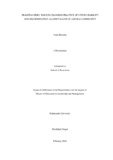
Please use this identifier to cite or link to this item:
https://hdl.handle.net/20.500.14301/371| Title: | eadteacher’s Role in Changing Practice of Untouchability and Discrimination Against Dalits in a Rural Community. |
| Authors: | Shrestha, Arati |
| Citation: | Shrestha,A.(2024).Headteacher’s role in changing practice of untouchability and discrimination against dalits in a rural community. |
| Issue Date: | Feb-2024 |
| Publisher: | Kathmandu University School of Education |
| School: | SOED |
| Department: | DOEL |
| Level: | Masters |
| Program: | M.Ed. in Leadership and Management (Two Year Program) |
| Abstract: | Being brought up in urban society, having to see and experience the discrimination towards Dalits in rural village is heart wrenching to me every time, when I visit my husband’s village. Untouchability and caste-based discrimination is still prevalent in the rural part of Nepal despite the nation’s law prohibiting it. Education and educational leaders are the driving force for social change phenomenon. Hence, as a student of education leadership, to study the role of the school headteacher in changing practice of untouchability and caste-based discrimination against Dalits in the rural community have formed the purpose of my study. Comparing the role of school headteachers with transformational leadership role, my study have led towards exploring different roles of headteachers in upgrading position of Dalits in the society and bringing change in attitude and practice of people towards them. Applying the lens of interpretivism, I have conducted qualitative research taking interview with three school headteachers and three Dalit participants from a rural community in Khotang. Field notes and observations have also been taken to provide valuable insights in the study. The study shows that headteachers play crucial role in enhancing the status of Dalits in rural communities. Firstly, they make the school Dalit friendly. They ensure timely distribution of scholarships and subsidies, encourage Dalit students to involve in different activities and promote social justice education among school stakeholders. Secondly, they advocate for social inclusion of Dalits in the community and raise awareness against bad culture, superstitious beliefs and blind faiths. They become role models by practicing discrimination-free activities themselves. In this way, their role aligned with four dimensions of transformational leadership. However, these descriptive role of headteachers are found less practiced in the rural community. Headteachers also fear social isolation when lobbying for change in the community. So, there is a challenge to headteachers to display leadership role in addressing discrimination in the community. Hence, headteachers as transformational leaders should exhibit high patience and resilience to such fear. In conclusion, the study shows that continuous determination and effort from headteachers is capable of changing attitude and ongoing practice of untouchability and discrimination towards Dalit in their rural community. |
| URI: | https://hdl.handle.net/20.500.14301/371 |
| Appears in Collections: | Disertation |
Files in This Item:
| File | Description | Size | Format | |
|---|---|---|---|---|
| WCC__ 28 April, 2024 (1).pdf | 560.38 kB | Adobe PDF |  View/Open |
Items in DSpace are protected by copyright, with all rights reserved, unless otherwise indicated.